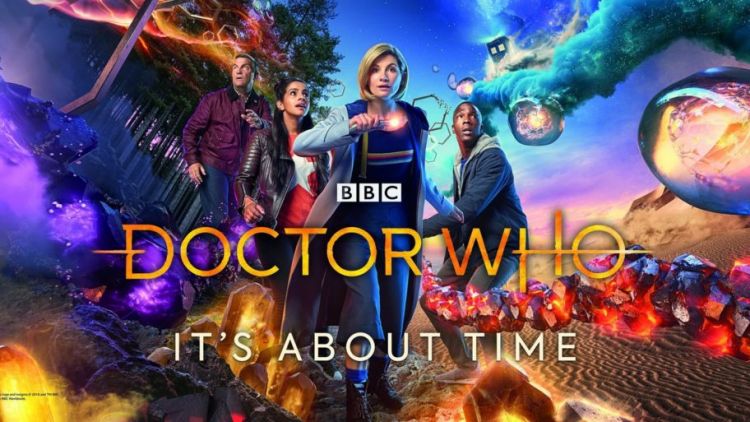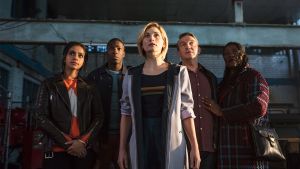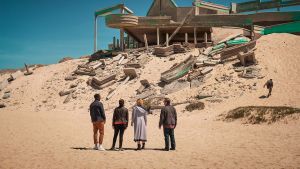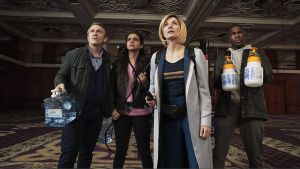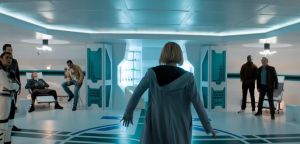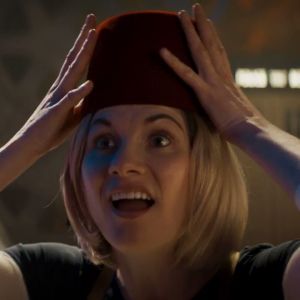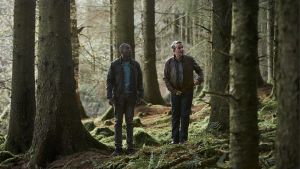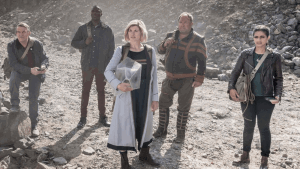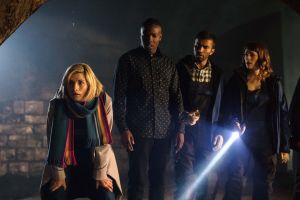The Doctor is in. Following Peter Capaldi’s take on the character and longtime showrunner Stephen Moffat’s departure, Doctor Who was primed for a shake up. And shake things up it did. First, Chris Chibnall took the reigns as showrunner and promised a new direction for the show, a sort of soft reboot. This season features none of the aliens or enemies from previous season, but all new monsters-of-the-week. Instead of one or two companions, the new Doctor travels with three, which has been done before. The latest season doesn’t have any two-part episodes and a couple of them opt for no classic title sequence. Certainly a lot of big changes, and we’re not even at the biggest. The new Doctor is a woman. Jodie Whittaker takes over the rule as the first-ever female Doctor.
So, before we get to the review of the individual episodes, how do these changes pan out? Overall, really well. While many expressed trepidation at having a female Doctor, it’s not made into a big deal. Sure, there are a couple of jokes about the Doctor coming to terms with it (“Come to Daddy, wait, no, come to Mama!”), but otherwise it’s not brought up. It’s also a testament to the acting and writing of the new season. Whittaker has a kind of “oh neat” attitude about her that never makes her feel like she’s jaded or bossy like previous versions of the character. Refraining from using two-part episodes allows the season to move efficiently. And by having all new villains, the show gives itself a breath of fresh air. The three-companion change does this as well, but suffers from overcrowding episodes and rarely gives us the chance to get to know any of the three all that well. By the end of the season I feel like I kind of know each one, so I’m hoping they all stick around for the next one so I can finally become familiar with them. In short, this season takes the show in a new direction, and while it doesn’t reinvent the wheel, it’s a pleasant regeneration for a show that was starting to show some seams.
The Woman Who Fell to Earth
Here we are. Jodie Whittaker’s debut as The Doctor. Well technically she appeared at the end of last year’s holiday special but here we get her saying more than a cameo. But first, we’re introduced to Ryan (Tosin Cole), Grace (Sharon D. Clarke), and Graham (Bradley Walsh). The family quickly joins up with police officer Yasmin Khan (Mandip Gill) after Ryan discovers a strange pod in the woods. Eventually an alien named Tzim-Sha emerges from the pod, because what else would be in it, and goes on the warpath.
While Chibnall promised less of an over-arching season narrative this time around, Tzim-Sha is still presented as an adversary who will turn up again later in the season. New Doctor episodes have to juggle a lot, especially when they’re also introducing three and a half new companions. I say three and a half since the fourth companion doesn’t make it through to the end of the episode. It’s impressive that the show is able to coherently introduce so much, but coherence isn’t synonymous with flawlessness. The alien feels kind of half-baked, and its plot to hunt down one specific human on Earth also doesn’t carry much agency.
Where the episode falls short on the story side, it does a great job of quickly checking all the requisite new Doctor boxes. The scene of the Doctor building a new sonic screwdriver (“Sheffield steel!”) is smile-inducing, as is her trip to get a new wardrobe. But the biggest success of the first episode is its emotional heft. There’s a sad moment towards the end that a lesser episode or show would decide to close on. Doctor Who decides to push through it and untangle the messy feelings that result. The Doctor traditionally doesn’t deal with closure well, but this incarnation sticks around to see the fallout of the situation. It’s a refreshing take that more than makes up for the crowded first half of the episode.
The Ghost Monument
While the first episode of the season introduces us to a wealth of new characters, it’s sorely lacking the Doctor’s primary mode of transportation: the TARDIS. The Doctor and gang (or fam) decide to track it down and become embroiled in an intergalactic contest in which two remaining contestants are racing to reach a certain landmark for a reward. The desolate planet of Desolation is more hostile than meets the eye, and the two contestants are wary of each other (and the fam) as they traverse its desert landscape.
One of the great things about Doctor Who is that it can lend itself to so many genres and premises for episodes. Taking on the “race for rewards” concept is a good idea, but the episode doesn’t get quite the mileage out of it that it could’ve. We see the race towards its very end. The stories of its two contestants are interesting but likewise not fully fleshed out. One of them wants the prize money for her family while the other was brought up to distrust people and is out for himself. While claiming a joint victory at the end makes the most sense, it’s not clear how these two characters reconcile their differences. It’s especially baffling since the host of the game clearly states that they can’t do such a thing, but quickly gives in under slight pressure.
“The Ghost Monument” really shines through its design. Sure, the planet of Desolation lives up to its name, but the remnants of a bygone civilization hint at the tragic fate that befell it. Doctor Who is also really good at making seemingly innocuous things scary, and we can now add “cloth” to that ever-growing list.
Rosa
In my opinion, Doctor Who is at its best when it deals with the past, not the future. Perhaps its because truth is often more interesting than fiction, but whatever the reason, this season’s history-based episodes are some of its best. Reunited with her TARDIS, the Doctor intends to bring everyone back to Sheffield in the present day but is instead rerouted to 1955 Alabama. There she discovers a plot to prevent Rosa Parks from being put in a situation where she’d have to give up her seat, which would in turn prevent the Civil Rights Movement from kicking off.
Oftentimes time-travel stories deal with people going back to prevent something, so the idea that the Doctor and her companions have to actively ensure that an event, and a negative one in the short term at that, does happen is a fresh spin on things. Vinette Robinson doesn’t just play Rosa Parks, she embodies her. There’s a tendency among actors playing historical figures to play up the notion of themselves as a part of history, but Robinson portrays Parks as a genuine person who history happened to cling to.
“Rosa” sees its unique time-travel concept through to the bitter end as the gang ultimately has to cause Rosa Parks to have to be presented with giving up her seat. It’s tough, and it highlights the complex moral ambiguities that run throughout this season. The villain is a bit one-note as a man from the future who’s reason is that he’s, shocker, a racist. While it’s not as intricate or surprising as the vast majority of the show’s previous villainous plots, it allows the episode to keep its focus elsewhere.
Arachnids in the UK
Just as Doctor Who delivers a plot as intriguing as “what if people had to cause Rosa Parks to have her seat denied in order to ensure the civil rights movement happens,” it’s just as capable of turning around and saying “what if spiders were really big?” That’s the conceit of this episode about really big spiders, aptly titled “Arachnids in the UK.” Back in modern day Sheffield, Doctor and friends find that really big spiders are afoot and seem to be have something to do with a new hotel that’s being built.
Did I mention the spiders are really big? That concept and your fear or fascination with spiders will determine your mileage on this one. While “Arachnids in the UK” does have a fun, shlocky horror vibe to it, it never quite takes this to the level it should be. There are some funny jokes about the Doctor getting confused about whether she’s dating her companions. Otherwise, the episode tries to mine comedy from the fact that its main villain is a Trump-like hotel owner who apparently hates the real Trump. It comes off more as a caricature than a real character, which is a shame for a show that’s usually quite good at fleshing out its heroes and villains.
The Tsuranga Conundrum
New showrunner or not, Doctor Who always has certain staples to fall back on, and “people on a malfunctioning spaceship” is one of the most done to death. “The Tsurange Conundrum” isn’t the most uninspired of the lot, but doesn’t add enough to really stand out. The alien damaging the ship looks and acts like something straight out of Lilo and Stitch, which isn’t the most boring creature we’ve seen. It’s the rest of the characters and plot that seem the most cut and paste. We’ve got a guy who is dedicated to a mission, a general who achieved a lot and wants to rest, and her brother who is afraid he isn’t good enough.
It’s a testament to Whittaker that she’s able to keep the episode going through her sheer energy and dedication to the role. As the 13th Doctor is constantly rushing around the spaceship trying to catch her breath, we’re meant to believe that the stakes are higher than they have any right to be. The special effects are a high point of this season, and the cute yet dangerous monster is a fun sight to look at.
Demons of the Punjab
As I said earlier, the historical episodes of Doctor Who are typically high-caliber, and it’s an added bonus when they cover a topic of history that many in the West may not know much about. Celebrating her grandmother’s birthday, Yaz receives a broken watch which her grandmother tells her she must never fix. Wanting to know more, Yaz gets the Doctor to take her and her pals back to the Punjab in 1947. Not only do they arrive one day before the partition of India, but they discover Yaz’s Muslim grandmother about to marry a Hindu man who they had never heard of before.
The guest cast is fantastic and its ultimately their stories that take the spotlight, even as aliens appear to meddle in events as they always do. The episode makes the smart move to use the aliens to further draw out the themes of the episode rather than having them as an obligation. I don’t want to spoil too much about these aliens, but let’s just say that the title “Demons of the Punjab” has a bit of a double-meaning. Doctor Who can often fall fall back on certain formulas, and it’s always refreshing to see these subverted.
If I had to pick a unifying theme for this season, I’d say that it deals with the mutable qualities of family. This episode highlights how families can grow and shrink, come together and fall apart, in several different ways. One of the difficulties of having three companions is that it be hard shed light on each one. Yaz had felt short-changed in previous episodes, so it’s nice to have one that gives more about her background and her relationship to family. Like some of the best of Doctor Who, “Demons of the Punjab” is peppered with happiness and heartbreak, which is underscored here by Segun Akinola’s South Asian variations of the show’s soundtrack.
Kerblam!
Despite my praise and personal affection for Doctor Who’s historical episodes, the show is primarily science fiction. Like the best science fiction, it works when it uses the genre to comment or satirize modern society. In “Kerblam!” the satire is fairly on-the-nose and the Doctor and co. investigate issues plaguing an intergalactic, futuristic equivalent of online retailer Amazon. A robotic, kind of creepy postman materializes in the TARDIS to deliver a package (it’s a fez!). When the Doctor also finds a “help!” message in the package, she takes the gang to Kerblam! headquarters to pose an employees and find out who sent this message and why.
For anyone who’s worked in retail, this episode is bound to deliver some catharsis. There’s a great moment when the Doctor explains to one of the managers how his job means he’s responsible for helping people, which in turn makes them productive workers. It comes off as genuinely imploring the manager to be better without feeling too patronizing, thanks to the the optimistic and genuine delivery that Whittaker excels at. While we only get so much time with Dan, Kira, and Charlie, three of the employees, the episode gives each of them enough personality for us to connect to them.
While the satire of the online retail business operates on a high level for the majority of the episode, it does falter at the end in a perplexing way. Just like the previous episode, the villains in this one aren’t who you think. This surprise twist somewhat undermines the messages from the rest of the episode, and ultimately the issues the employees have with the corporation are resolved in a sort of hand-waving fashion. However, the episode really reaches a high-point with the antagonist’s weapon of choice, and how it turns a seemingly trivial action into something sinister.
The Witchfinders
Many science fiction fans may already be familiar with Arthur C. Clarke’s Third Law that “any sufficiently advanced technology is indistinguishable from magic.” This could easily apply to any Doctor Who episode, but is fittingly used here in an episode about a 17th century English village that mistakes alien involvement for witchcraft. Arriving in 1612 Lancashire, the Doctor and friends witness an elderly woman executed for alleged witchcraft. She later reanimates due to some kind of mud, which is naturally of alien origin but something everyone else chocks up to the work of witches.
Sometimes a guest star is all it takes to make or break and episode, and thankfully Alan Cumming’s turn as King James raises an otherwise serviceable episode to a higher level. You can tell he’s having fun with the role, sneaking around in disguise before he reveals himself in the most ostentatious fashion. While the character could come off as one note in the hand of a lesser actor, Cumming plays up this pretentious nature to show how King James hides his insecurities. One of the pitfalls of shows featuring historical cameos is that they often distill these figures into heroes or villains. Aided by the writing, Cumming highlights the moral complexity of King James, wanting to keep England safe while carrying out destructive witch hunts.
It Take You Away
If I had to characterize Doctor Who in two words, those might be “weird” and “wonderful.” In the present day, the Doctor and her companions visit Norway. It’s worth mentioning that most of the episodes this season begin with the Doctor doing something quirky, and this time it’s eating soil to determine what country they’re in and what the TripAdvisor rating of the nearest attraction is. This also tells them that there’s a cottage nearby, and when they go to explore they find it’s all boarded up. The young girl inside informs them that a creature took her father away, and since she’s blind, she can’t go looking for him on her own.
One of the biggest credits to this episode is that the plot is more complex than it initially seems. Much more. I didn’t expect this episode to incorporate characters and themes from earlier in this season, but it did in surprising ways. The gang quickly discover that the monster is in fact coming from inside the house, and that’s if there even is a monster at all. A mirror proves to be a portal into an alternate dimension, an Antizone between two realities. Nothing is as it seems, and twists keep coming up until the very end, which involves the Doctor having a hard discussion with a talking frog. Naturally.
Typing it out, it seems like this episode has a lot of hoops to jump through, and I purposely left out the biggest twists and turns. Nevertheless, the methodical pacing of the episode and prior information from earlier in this season ensures that the episode isn’t weighed down by them. The design deserves a mention here, as the episode plays on Nordic motifs and myths as it unfolds. The Antizone comes off as a suitably dark and creepy realm of monsters and mystery juxtaposed with the bright, natural terrain of Norway.
The Battle of Ranskoor Av Kolos
In lacking any two-part episodes or overarching storylines, the latest season doesn’t have much to tie it together from a plot point of view. The themes of family run through the season, but there isn’t a single goal or conflict that it’s focused on. “The Battle of Ranskoor Av Kolos” is the closest to an attempt to bring the adventures full circle, as Tzim-Sha from the first episode shows up on another planet to have his revenge. While it’s been only a short while for the TARDIS crew, the wicked alien has been in exile for thousands of years on Ranskoor Av Kolos. This planet has a psychic field that alters one’s perception of reality, and the race of beings who live there, the Ux, have the power to alter reality itself.
The ability to manipulate reality is an interesting one, especially when Tzim-Sha has convinced the Ux that he is their god. Nevertheless, there isn’t much done with it. The most interesting conflicts here are the misplaced faith of the Ux and Graham’s desire to seek revenge on Tzim-Sha for the catastrophe’s of the first episode. But even here, more could have been done, and these moral dilemmas take a back-seat to the machinations of the plot. The Doctor’s unwillingness to allow Graham to seek revenge is in line with the character’s morals, but one would’ve hoped that this more empathetic iteration would’ve at least had more understanding.
On the whole, “The Battle of Ranskoor Av Kolos” isn’t a bad episode, but one would’ve hoped for more from a series finale. It’s perplexing that for a season that seems to value themes over plot, this episode shirks the moral dilemmas of friends and family to focus on a plot that just isn’t as interesting. The moments between Graham and Ryan are the most intriguing, along with the plight of the Ux, but the episode doesn’t quite do them justice.
Resolution
Just like each Doctor has an episode early on (hopefully) where they really click, there’s also the one further down the road where they get to exchange the emotional heavy lifting for a fun action romp where they pull off some stunts and look cool along the way. “Resolution” is essentially the 13th Doctor’s action vehicle, and since Jodie Whittaker’s take is already a fun-loving one, she really seems to be having a good time here. It’s infectious. The episode also succeeds at feeling like a true season finale, calling back to the themes and character arcs put forth throughout the season.
The biggest thing about this episode is that it’s the first of the new season to feature the Daleks. Chris Chibnall had said we wouldn’t see them this year. But it’s the new year’s special, so aha. First things first, I personally think the Daleks are overused, so it was nice to see restraint. This episode features just one Dalek that spends much of its time outside its case, strapped to a hapless human host. You wouldn’t think Doctor Who would be able to make a single Dalek seem intimidating again, but the gradual build up of this one manipulating Lin to get what it wants, designing a new suit out of scrap metal, and then taking on the army proved effective. Charlotte Ritchie deserves a special shoutout as Lin, as she clearly conveyed the internal battle raging inside her as the Dalek took control of her physical actions.
Some may bemoan the fact that “Resolution” replaced the long standing tradition of having a holiday episode, but it more than justifies this decision. While the holiday episodes are cute, they rarely contain any storytelling weight to them. What this season needed after last episode’s somewhat lackluster conclusion was a story that genuinely felt high stakes, and “Resolution” delivered. It even worked to flesh out the backstories and characters of Ryan and Graham, as Ryan’s absent dad Aaron suddenly shows up to reconnect. With emotions running high, the ending could’ve taken some shocking turns, but the episode managed to provide a relatively positive conclusion that still felt earned.
The latest season brings a lot of new changes to the show, but stays true to the themes and stories that make the Doctor's adventures worth watching.
Introducing a new Doctor and companion is always tough, since these are the characters the show will focus on for the next season or so. In some ways, the latest season of Doctor Who feels like another soft reboot for the series.
Aside from Jodie Whitaker playing the first female iteration of The Doctor, Chris Chibnall takes over for longtime showrunner Stephen Moffat. Chibnall’s Doctor Who has a more cinematic feel to it, and is slightly more bleaker and quieter than previous seasons. Juxtaposing this is Whitaker’s Doctor, who is as optimistic as ever, but in a sort of “everything sucks but hey we’re gonna roll with the punches” kind of way. Typically each “new Doctor” introduction has a self-congratulatory tone about how great the Doctor is and how lucky the companions are to be taken aboard. This season doesn’t go for that, and in a way it makes both the show and the Doctor all the more exciting by trusting the audience to want to go on this journey. And we do.
-
Doctor Who Series 11
-
The Woman Who Fell to Earth
-
The Ghost Monument
-
Rosa
-
Arachnids in the UK
-
The Tsuranga Conundrum
-
Demons of the Punjab
-
Kerblam!
-
The Witchfinders
-
It Takes You Away
-
The Battle of Ranskoor Av Kolos
-
Resolution


